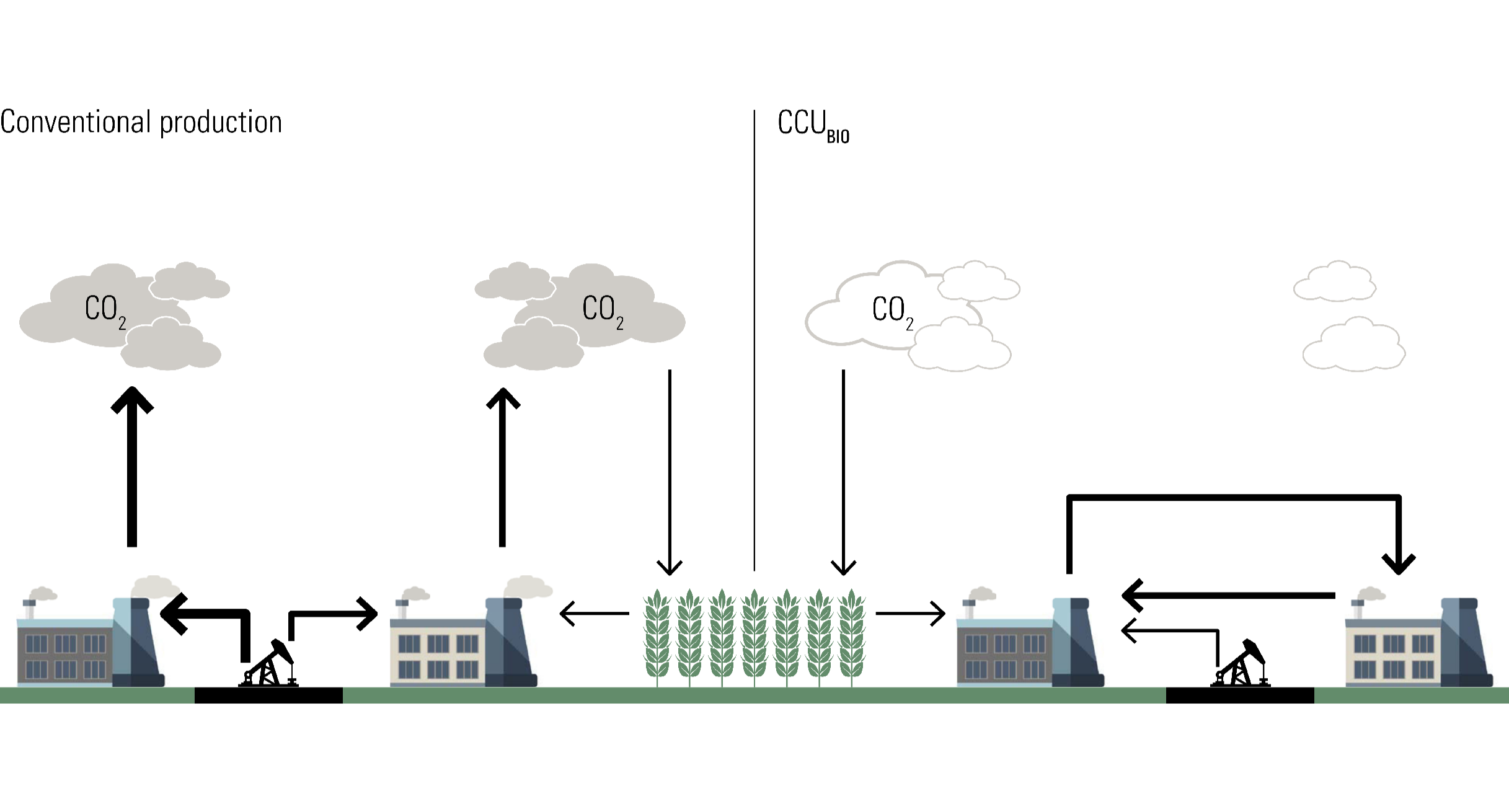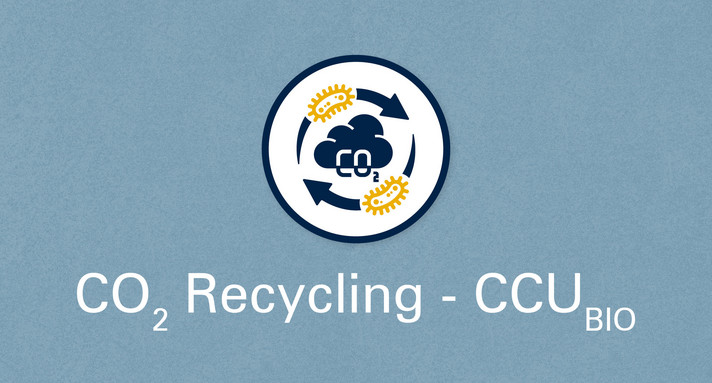CO2 emissions are considered to be the cause of the greenhouse effect and thus a significant driver of climate change. At the same time, carbon and organic carbon compounds are also important raw materials for numerous industrial applications and products.
Binding harmful CO2 emissions from exhaust gases before they enter the atmosphere and recycling the carbon into economically usable materials by means of biotechnical processes is what the term "biological carbon capture-and-use (Bio-CCU for short)" refers to. At the end of these processes, carbon is made available again as a raw material in the sense of the circular economy. This can not only create the basis for a circular carbon economy (also "Circular Carbon Economy" (CCE)), but also make a helpful contribution to climate protection.
Further developing and establishing biotechnical processes and technologies for recycling CO2 are among the topics that the Ministry for the Environment, Climate and Energy Sector of Baden-Württemberg currently pursuing as part of the State Strategy for a Sustainable Bioeconomy (Measure 20). In this context, parts of the natural carbon cycle – the conversion of CO2 into more complex carbon compounds, for example, by means of bacterial metabolic processes – are used or imitated through the application of hybrid approaches from technology and biology.
The advantage of such bio-economic process chains is that, compared to purely chemical or physical methods, such as natural photosynthesis, they can offer higher value creation (Bio-CCE) in addition to partly higher efficiency.
Innovation Hub CCUBIO - Innovation ecosystem for biological CO2 recycling
The innovation network "Hub CCUBIO" is the central point of contact in Baden-Württemberg to further advance biological CO2 recycling and to leverage the potential of companies. The Innovation Hub CCUBIO is located at the State Agency for Environmental Technology BW (Umwelttechnik BW) and, together with research and industry, is intended to apply CCUBIO technologies that separate CO2 emissions, process them using biological technologies and use them as recycled carbon (R-Carbon) then make it available to the economy again (so-called biological carbon capture and utilization or short: CCUBIO).
Further information can be found on the website of Umwelttechnik BW (in German language).

The figure shows a comparison of a conventional industrial carbon cycle to a closed carbon cycle using CCUBIO. CCU stands for Carbon Capture and Utilisation.
On the left side a conventional production system, which follows a linear carbon utilization, is shown. Fossil resources are used to provide carbon.
In industrial processes carbon is utilized for production purposes, which result in CO2 production. The CO2 is released into the atmosphere resulting in a loss of carbon which can´t be utilized as raw material. The existing biomass can only absorb a limited amount of CO2 from the atmosphere resulting in an accumulation of CO2 in the atmosphere, respectively.
On the right side of the figure a closed carbon cycle is shown, using carbon dioxide as a primary raw material source. Starting point are the industrial plants emitting CO2. The CO2 deriving from industrial processes is captured by using biotechnological processes, preventing its release into the atmosphere. Biotechnological processes produce valuable substances such as solvents, fuel, grease and plastics. These substances form raw materials for further industrial processes. Again, the produced CO2 is separated and recovered as a raw material. Hence, a carbon cycle is established, the exploitation of fossil resources is reduced and the emission of CO2 into the atmosphere is avoided. Under these circumstances the biomass can contribute to a reduction of atmospheric CO2 concentrations.
Technology and market study for an overview of technologies and players in Baden-Württemberg
A study by the Fraunhofer ISI, funded by the Ministry for the Environment, Climate and Energy Sector of Baden-Württemberg demonstrates the potential for the establishment of Bio-CCU and Bio-CCE technologies and processes that Baden-Württemberg has to offer thanks to its innovative strength. Specifically, the technology and market study provides an overview of the technologies for bio-inspired CO2 fixation and utilisation as well as the players in Baden-Württemberg.
Feasibility study shows potentials and concepts for industrial sites with high CO2 emissions in Baden-Württemberg
The feasibility study published in November 2021 by Umwelttechnik BW, University of Stuttgart and Fraunhofer IGB shows application and value creation potentials for CO2 recycling from industrial waste gases in Baden-Württemberg. The Ministry for the Environment, Climate and Energy Sector of Baden-Württemberg funded the study as part of the State Strategy for a Sustainable Bioeconomy.
Greenhouse gas emissions are produced in a wide variety of industrial processes - for example, in the production of cement, the incineration of waste or the generation of biogas. Avoiding these process-related CO2 emissions is difficult or even impossible.
Other solutions are needed so that such industries can also become climate-neutral. One option is to separate the resulting CO2, process it with biological or hybrid technologies and thus make it available as renewable carbon sources for numerous industrial applications and products. This process is summarised under the term "biological carbon capture and utilisation (CCU-BIO for short).

